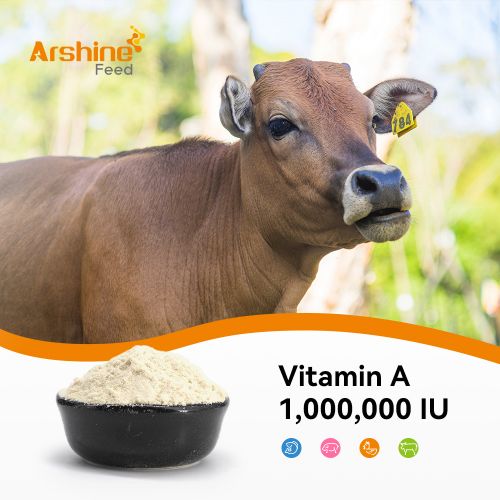

Vitamin A Acetate is a fat-soluble vitamin, in the form of yellow flake crystals or crystalline powder. The reasonable addition of vitamin A will greatly promote the healthy growth and development of animals.
Product Name: Vitamin A 1000 Feed Grade
Appearance: Pale yellow to brown granular powder
Active ingredient
Chemical name All-trans-3,7-dimethyl-9-(2,6,6-trimethyl-1-cyclohexen-1-yl)-2,4,6,8-
nonatetraene-1-yl acetate
CAS No. 127-47-9
EINECS No. 204-844-2
Synonyms Vitamin A acetate, Retinyl acetate
Structural formula
Molecular mass 328.54 g/mol
Molecular formula C22H32O2
Appearance Pale yellow to brown granular powder
Vitamin A Acetate Content Min 1,000,000IU/g (HPLC-method)
Loss on drying Max 5.0%
Granularity 100% go through the sieve of 0.84mm (US standard mesh sieve No.20)
Other chemical and physical data
Description The product contains Vitamin A acetate, which is coated by gelatin, starch and
sugar, and stabilized with antioxidant.
Solubility Insoluble in water
Package
25 kilograms net in bag
Uses and EC-regulations
Product to be used for premixes and feeding stuffs for all animal species and categories in
accordance with maximum dosages allowed; use in liquid feed (e.g. milk replacer) is not
recommended. Product fulfills all requirements of EC Regulation 1831/2003 for feed additives resp. EC Directive 2002/32 regarding undesired substances in feed additives. For handling of product resp. Information on safety see KINGDOMWAY Material Safety Data Sheet.
The information is based on our current knowledge however it does not represent a guarantee of product properties nor does it create any legal obligation.
Vitamin A is necessary for many functions in ruminants including: vision, bone growth, immunity and maintenance of epithelial tissue. Vitamin A is essential for proper vision and is utilized in the retina in the chemical reactions necessary for sight. Vitamin A deficiency results in night blindness and formation of ulcers on the cornea. Vitamin A affects bone development through its effect on bone metabolism. Essentially, Vitamin A deficiency results in unchecked bone growth that in turn manifests as malformed bones and joints. Vitamin A directly affects immunity through both production of antibodies and through maintaining an adequate barrier to infection with healthy epithelial cells. Vitamin A deficiency reduces the primary antibody response in the event of infection.
Add: Block 14, No.100, Luyun Road,Changsha 410205,China.
Mobile: +86 18874001228
Email: info@arshinefeed.com
WhatsApp: 8618874001228
WeChat: weiyuyan91